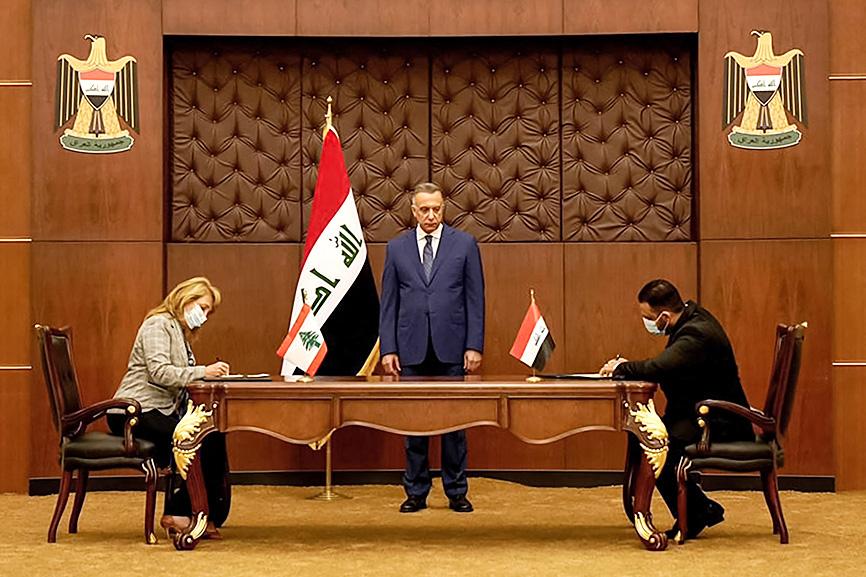Iraqi Prime Minister Mustafa al-Kadhemi on Saturday announced the arrest of a “terror cell” that is allegedly behind a Baghdad market bombing that killed dozens. The attack was claimed by the Islamic State (IS) group.
The bombing sparked revulsion and renewed fears about the reach of the IS, which lost its last territory in Iraq after a grueling military campaign that ended in late 2017, but retains sleeper cells in remote mountains and desert areas.
The bombing took place on Monday at the Al-Woheilat market in Sadr City, a Shiite suburb of the capital, and officially killed 30 people.

Photo: AFP / IRAQI PRIME MINISTER’S PRESS OFFICE
“We have arrested all the members of the cowardly terrorist cell that planned and perpetrated the attack,” al-Kadhemi wrote on Twitter. “They will be put before a judge today.”
Al-Kadhemi did not specify the number of people arrested, but a source at the Iraqi Ministry of the Interior said that the suspects were anticipated to make televised “confessions,” a common occurrence for major crimes in Iraq.
Deadly attacks were common in Baghdad during the sectarian bloodletting that followed the US-led invasion of Iraq in 2003, as well as when the IS swept across much of the country in a lightning 2014 offensive.
Iraq declared the IS defeated in late 2017 after a fierce three-year campaign, and attacks became relatively rare in the capital until January, when a twin IS-claimed suicide bombing killed 32 people.
The US-led coalition that supported Iraq’s campaign against the IS has over the past year significantly drawn down its troop levels, citing increased capabilities of Iraqi forces.
Elsewhere in the country, an armed drone targeted a military base in the Kurdistan region that hosts US troops, but without casualties, the US-led coalition said on Saturday.
It was the latest in a spate of attacks on US military and diplomatic facilities in the country.
US facilities in Iraq have been hit by 50 rocket and drone attacks so far this year — assaults Washington consistently blames on Tehran-backed factions operating within Iraq’s Hashed al-Shaabi paramilitary alliance.
The Iraqi Resistance Coordination Committee on Friday threatened to continue the attacks unless the US withdraws all its forces and ends the “occupation.”
Most of the US troops deployed in the coalition, which helped defeat the IS in Iraq, were withdrawn under former US president Donald Trump.
Those who remain are officially classed as advisers and trainers for Iraqi military and counterterrorism units.
Al-Kadhemi is expected to meet US President Joe Biden in Washington today to discuss a possible full US troop withdrawal from the country.
However, analysts say that events in the wake of a partial US troops withdrawal from Iraq in 2011 — notably the rise of the IS — might make Biden reluctant to authorize a full pullout, as that might give the group room to regenerate.

ELECTION DISTRACTION? When attention shifted away from the fight against the militants to politics, losses and setbacks in the battlefield increased, an analyst said Recent clashes in Somalia’s semi-autonomous Jubaland region are alarming experts, exposing cracks in the country’s federal system and creating an opening for militant group al-Shabaab to gain ground. Following years of conflict, Somalia is a loose federation of five semi-autonomous member states — Puntland, Jubaland, Galmudug, Hirshabelle and South West — that maintain often fractious relations with the central government in the capital, Mogadishu. However, ahead of elections next year, Somalia has sought to assert control over its member states, which security analysts said has created gaps for al-Shabaab infiltration. Last week, two Somalian soldiers were killed in clashes between pro-government forces and

Ten cheetah cubs held in captivity since birth and destined for international wildlife trade markets have been rescued in Somaliland, a breakaway region of Somalia. They were all in stable condition despite all of them having been undernourished and limping due to being tied in captivity for months, said Laurie Marker, founder of the Cheetah Conservation Fund, which is caring for the cubs. One eight-month-old cub was unable to walk after been tied up for six months, while a five-month-old was “very malnourished [a bag of bones], with sores all over her body and full of botfly maggots which are under the

BRUSHED OFF: An ambassador to Australia previously said that Beijing does not see a reason to apologize for its naval exercises and military maneuvers in international areas China set off alarm bells in New Zealand when it dispatched powerful warships on unprecedented missions in the South Pacific without explanation, military documents showed. Beijing has spent years expanding its reach in the southern Pacific Ocean, courting island nations with new hospitals, freshly paved roads and generous offers of climate aid. However, these diplomatic efforts have increasingly been accompanied by more overt displays of military power. Three Chinese warships sailed the Tasman Sea between Australia and New Zealand in February, the first time such a task group had been sighted in those waters. “We have never seen vessels with this capability

‘NO INTEGRITY’: The chief judge expressed concern over how the sentence would be perceived given that military detention is believed to be easier than civilian prison A military court yesterday sentenced a New Zealand soldier to two years’ detention for attempting to spy for a foreign power. The soldier, whose name has been suppressed, admitted to attempted espionage, accessing a computer system for a dishonest purpose and knowingly possessing an objectionable publication. He was ordered into military detention at Burnham Military Camp near Christchurch and would be dismissed from the New Zealand Defence Force at the end of his sentence. His admission and its acceptance by the court marked the first spying conviction in New Zealand’s history. The soldier would be paid at half his previous rate until his dismissal